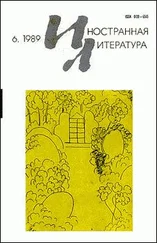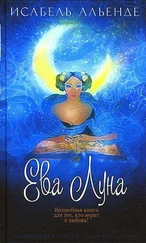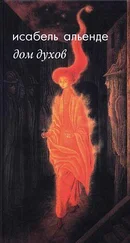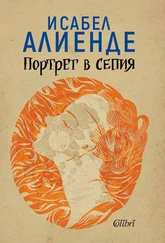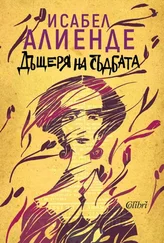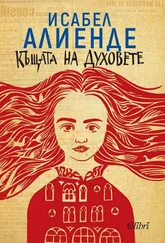“Explain to me what exiles are, Papa,” Ofelia insisted.
“Listen, sweetheart, in Spain there was a revolution of bad people. It was a catastrophe. The military rose against it and fought for the values of the fatherland and morality. Naturally, they won.”
“What did they win?”
“The Civil War. They saved Spain. The exiles Felipe talks of are the cowards who escaped and are in France.”
“Why did they escape?”
“Because they lost and had to face the consequences.”
“I think there are lots of women and children among the refugees, Isidro. The newspaper says there are hundreds of thousands of them…” Laura commented timidly.
“That may be. But what does Chile have to do with all of it? Neruda’s the one to blame! That communist! Felipe has no common sense, it’s as if he weren’t my son. I’m going to have to set him straight when we get back.”
Laura seized on this to suggest it might be better to return to Santiago before Felipe did anything crazy, but the newspaper said the Winnipeg would be leaving in August. They had more than enough time to go to the spa at Evian, visit Lourdes, as well as the shrine of San Antonio of Padua in Italy to fulfill Laura’s many vows, as well as the Vatican to receive a private blessing from the new Pope Pius XII, which had cost Isidro a lot of pulling of strings and money, before they came back to England. There they would leave Ofelia at the finishing school, by force if need be, and then he would embark with his wife for the journey back to Chile on board the Reina del Pacifico. In other words, a perfect trip.
CHAPTER 5
1939
Let’s keep anger, pain, and tears,
Let’s fill the desolate void
And may the nightly bonfire recall
The light of the deceased stars.
—PABLO NERUDA
“José Miguel Carrera, 1810”
CANTO GENERAL
VICTOR DALMAU SPENT SEVERAL MONTHS in the concentration camp at Argeles-sur-Mer, never once suspecting that Roser had been there as well. He had not heard any news of Aitor, but supposed he had kept his promise to get his mother and Roser out of Spain. At this point the inhabitants of the camp were almost exclusively male, tens of thousands of Republican soldiers, who suffered hunger and deprivation, as well as blows and constant humiliation from their jailers. Although the conditions were still inhuman, at least the harshest days of winter were behind them.
In order to survive without going mad, the prisoners organized themselves. The different political parties held revolutionary meetings separately, just as they had during the war. They sang, read whatever they could lay their hands on, taught those who needed it to read and write, published a newspaper of sorts—a handwritten sheet of paper that was passed from reader to reader—and sought to preserve their dignity cutting one another’s hair and checking each other for lice and washing their clothes in the freezing seawater. They divided the camp into streets with poetic names, outlined absurd squares and ramblas like those in Barcelona in the sand and mud, created the illusion of an orchestra without instruments to perform classical and popular music, and restaurants with invisible food that the cooks described in great detail while the others savored the tastes with their eyes closed. With what little building supplies they had, they managed to construct sheds, barracks, and huts. They were constantly alert for news from the outside world, which was on the brink of another war, and for the possibility of being set free. The more skilled among them were often employed in the countryside or in industry, but the majority had been farm laborers, woodcutters, shepherds, or fishermen, and so had no skills usable in France. They came under constant pressure from the authorities to be repatriated to Spain, and were sometimes fooled into being taken to the Spanish border.
Victor stayed in the camp with a small team of doctors and nurses, because on that infernal beach they had a mission: to serve the sick, the wounded, and the crazy. The legend that he had restarted the heart of a dead young soldier at the Estacion del Norte had preceded him, and this gave his patients a blind trust in him, although he always insisted that if they were seriously ill they should see one of the doctors. There were never enough hours in the day for his work. The boredom and depression that were the scourge of most of the prisoners didn’t affect him: on the contrary, he found in his work a stimulus that was close to happiness. He was as skinny and weak as the rest of the men in the camp, but didn’t feel hungry, and more than once gave his ration of dried cod to someone else. His comrades said he must have been eating sand. He began work at first light, but after sunset still had several hours to fill, so he would pick up his guitar and sing. He had done so only rarely during the years of the Civil War, but he remembered the romantic ballads his mother had taught him to combat his shyness, and of course revolutionary songs, during which others joined in for the chorus. The guitar had belonged to a youngster from Andalusia who kept it with him throughout the war, went into exile without letting go of it, and played it at Argeles-sur-Mer until the end of February, when he was carried off by pneumonia. Victor cared for him in his final days, and so the boy left him the instrument by way of inheritance. It was one of the few real instruments in the camp; most were fantasy ones whose sounds were imitated by men who were good mimics.
As the months went by, overcrowding in the camp gradually diminished. The old and infirm died off and were buried in a cemetery adjacent to the camp. The luckiest among the prisoners obtained sponsors and visas to emigrate to Mexico and South America. Many of the soldiers joined the French Foreign Legion, despite its brutal discipline and its reputation for harboring criminals, since anything was better than remaining in the camp. Those with suitable qualifications were recruited for the Foreign Workers Companies created to replace the French workforce called up in preparation for the coming war. Later on, others were to go to the Soviet Union to fight with the Red Army or join the French Resistance, and thousands of them died in Nazi death camps or Stalin’s gulags.
One day in April 1939, when the unbearable winter cold had given way to spring and the first warmth of summer was on the horizon, Victor was called to the camp commander’s office. He had a visitor. It was Aitor Ibarra, wearing a straw boater and white shoes. It was almost a minute before Aitor recognized Victor in the ragged scarecrow standing in front of him. When he did, they embraced with great emotion, both with moist eyes.
“You can’t imagine the trouble I’ve had finding you, brother, you’re not on any list; I thought you were dead,” Aitor said.
“Almost. And you: how come you’re all dressed up as a pimp?”
“As a businessman, you mean. I’ll tell you later.”
“Tell me first what happened to my mother and Roser.”
Aitor told him how Carme had disappeared. He had made inquiries but had not heard anything concrete, except that she had not returned to Barcelona. The Dalmau house had been commandeered, and another family was living there now. He had good news about Roser, though. He briefly told Victor about how they had escaped from Barcelona, then crossed the peaks of the Pyrenees on foot, and how they were separated after reaching France. For a while, he’d had no news of her.
“I escaped as soon as I could, Victor. I don’t know why you haven’t tried: it’s easy.”
“They need me here.”
“Thinking like that means you’ll always be in trouble.”
“That’s true, but what can I do? Tell me about Roser.”
Читать дальше




